

Samantha Sims
Seeing and Being, Together.
Google Docs - create and edit documents online, for free. One account.

All of Google. Sign in to continue to Docs Find my account Forgot password? Sign in with a different account Create account.
Strategy Ed.L.D. Peter Senge and learning organizations. Mind map of learning organization disciplines.
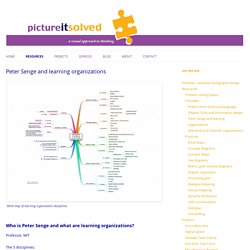
Emotional Intelligence: Is it Necessary for Leader Development? Examination of these models reveals that an emotionally intelligent leader is conscious about and responsive to his/her emotions, possessing the ability to harness and control them in order to deal with people effectively and make the best decisions.
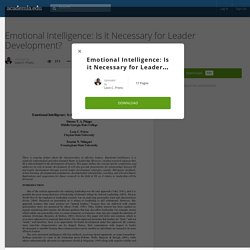
Landale (2007) phrases it quite simply and effectively in the six-step process for developing a person’s EI. The process includes 1) knowing what you feel, 2) knowing why you feel it, 3) acknowledging emotion and knowing how to manage it, 4) knowing how to motivate yourself and make yourself feel better, 5) recognizing the emotions of other people and developing empathy, and 6) expressing feelings appropriately and managing relationships. Leader development and leadership development are frequently used interchangeably. However, there is a distinction between the two, regardless of how subtle the difference may seem. Create routines061807. Essential Procedures List. Routines and Procedures for Managing Your Classroom. Effective classroom teachers spend more of their time in the first few weeks of the year teaching classroom routines and procedures as opposed to academic content.

Why? Because routines and procedures are the key to a well-managed, organized classroom. Research shows that most behavior problems result from lack of classroom routines and procedures. Moreover, the number of interruptions to academic instruction are reduced and the class flows more smoothly. Points to remember: 182_VocabularyTiers.pdf. Section 1: Why Compare & Contrast? By Harvey F.

Silver. Bloom_s-rev_3-09.pdf. Visual Perceptual Skills. Visual Perceptual Processing Visual perceptual processing, or visual information processing, is a set of skills we use to gather visual information from the environment and integrate them with our other senses.
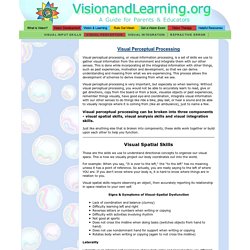
This is done while incorporating all the integrated information with other things, such as past experiences, motivation and development, so that we can derive understanding and meaning from what we are experiencing. This process allows the development of schemes to derive meaning from what we see. Visual perceptual processing is very important, but especially so when learning. Visual perceptual processing can be broken into three components - visual spatial skills, visual analysis skills and visual integration skills. Just like anything else that is broken into components, these skills work together or build upon each other to help you function.
Visual Spatial Skills. Why Call on Just One When We Can Call on Everyone? Dr.

Spencer Kagan To cite this article: Kagan, S. Staff Development and Change Process: Cut from the Same Cloth - Issues ...about Change, Staff Development and Change Process: Cut from the Same Cloth, Volume 4, Number 2. Home | Issues ...about Change Archive | Staff Development and Change Process: Cut from the Same Cloth Most staff developers would agree that the goal of staff development is change in individuals' knowledge, understanding, behaviors, skills - and in values and beliefs.

Too often, it appears this fundamental view of staff development is unheeded or forgotten. However, if change of some understanding, skill, or behavior is the desired outcome of staff development, it seems reasonable to explore the relationship. In this paper, a well-researched model of staff development is described. Findings of a research study that explored the effectiveness of the model's components are included. A large majority of school, district, higher education, and state level practitioners agree that staff development offerings typically focus only on the first component of a staff development model articulated by Joyce and Showers (1980), omitting the remaining four. LA BOTICA DEL ORIENTADOR: 126 DINÁMICAS DE EDUCACIÓN EMOCIONAL. Cada vez tengo más claro que la Educación Emocional y todo lo que tras este concepto se engloba es una de las claves para intentar comprender el mundo actual, hacer que lo comprendan nuestros alumnos y no morir de pena en el intento.
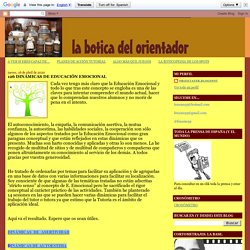
Co-Creation in Theory U: Leading from the Future as it Emerges & the Road to Commitment « Reveln Consulting. Source: Otto Sharmer and The Presencing Institute The terms “letting go” and “letting come,” captured my imagination as Theory U arrived on scene several years ago.
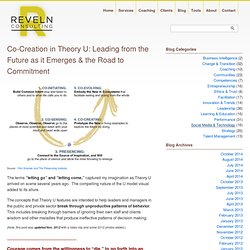
The compelling nature of the U model visual added to its allure. Motivation. Kstoolkit. Special Education.
Mother Nurture. Mother Nurture: A Mother’s Guide to Health in Body, Mind, and Intimate Relationships. Penguin, March, 2002. First author. (Co-authored with Jan Hanson, L.Ac. and Ricki Pollycove, M.D.) Mothers today juggle more tasks, work longer hours, and sleep less than their own mothers did. Yet the self-healing revolution has overlooked the most significant issue in the lives of some twenty million women: how to cope with the relentless, sometimes overwhelming, stresses of raising young children in the twenty-first century. Subsecretaría de Educación Media Superior. Atajos accesibles a las secciones de está página Herramientas del Sitio Buscador Navegación principal Notas recientes Convocatorias y eventos Alumnos Docentes Padres de familia Enlaces relacionados Redes sociales Programas institucionales Otros enlaces de interés Dirección de la Subsecretaría de Educación Media Superior Políticas de Privacidad. CF “Ice Breaker” Questions. Great questions designed to help people in small groups get to know one another.
If you could live in any sitcom, which one would it be? What was in your high school locker? Best dessert you have ever had? Something interesting you might not know about me is . . .
Liderazgo. Love and Logic. Making Art. Resilience. La Vaca Independiente - unbrandme32 - Gmail. Radio en Vivo. Webquests. Teambuilders and icebreakers. OnlineTeaching&Learning - Learning Activities for Online Classes. IRIS Resource Locator. Center on Enhancing Early Learning Outcomes (CEELO) The Center on Enhancing Early Learning Outcomes (CEELO) works to strengthen the capacity of state education agencies (SEAs) to lead sustained improvements in early learning opportunities and outcomes. Resources on this site include publications, webinars, and presentations about EI/ECE assessment, as well as links to other centers. The CEELO Annotated Bibliography on Early Childhood Assessment highlights resources found on the Website.
This center works in partnership with SEAs, state and local early childhood leaders, and other federal and national technical assistance providers to promote innovation and accountability. To help SEAs improve services for infants, toddlers, and young children, resources on this site include publications, webinars, presentations, and links to other Websites for various topics: assessment, data, practices for children from birth through third grade, workforce, systems, and child outcomes. Small Group Teaching — E-Learning Modules. You are here: Home / Small Group Teaching This module introduces the topic of small group teaching and links closely with the modules Facilitating learning in the workplace and Improve your lecturing. This module briefly considers how small group teaching can be planned and structured and some of the techniques teachers can use to facilitate group and individual learning, including strategies for preventing difficult situations in groups. By the end of the module you should have learned and updated some of the principles behind running small group teaching sessions and considered some of the issues involved in ensuring that groups function well and that the learning environment is conducive to learning for all those involved.
You will also have an opportunity to apply the learning from the module to your own practice through carrying out activities and reflecting on these. Small Group Teaching — E-Learning Modules.
Definitions of Bloom's Taxonomy. Activities at Various Cognitive Levels of Learning (LoL) Bloom’s taxonomy of learning objectives is used to define how well a skill or competency is learned or mastered. A fuller description of Bloom’s taxonomy is given in the following pages but a brief summary of the activities associated with each level is given below. Mindset. Reflection. Systems. Www.nonformality.org/blog/wp-content/uploads/2006/12/mappingdialogue.pdf. Whole_cartoon.jpg (750×1125) Ladder of Inference.pdf. Klc.karvy.com/Growth and Development/Balancing Inquiry and Advocacy.pdf. Triad Consulting Group. More Tools for Dialogue. These articles, worksheets, and graphics describe some of the ideas, values, and theories that underlie our approach to dialogue. They also explain some of the skills and practices that we promote. The materials on this page come from a variety of organizations and authors. You may wish to use them in several ways—reading them on your own, studying them with a friend, using them to lead training exercises, or sharing them with participants in groups that you facilitate.
Defining Dialogue -- A handout from the from the Public Conversations Project that describes what we mean by dialogue and how dialogue contrasts with debate. Balancing Inquiry and Advocacy -- A short article that provides detailed, practical guidance for talking across differences about the difficult issues, using the key skills of "inquiry" and "advocacy. " Www.kaiser.net/images/UserFiles/files/ConsciousLeadership.pdf. Spiritual Awakening Process: Understanding How to Hold Space.
Spiritual Awakening Process: Understanding How to Hold Space. The Art of Holding Space. As life continues to teach, my mind continues to try to categorize and make sense of its lessons. Recently, the lesson that I seem to be learning over and over again is the art of holding space. (Well, that, and the art of letting go, but we've already covered that in previous posts). Holding Space: What Does It Mean & How Do We Do It? Holding space. Brain gym – simple exercises for a better mind and body. A simple series of exercises could help your brain function better, making you sharper, smarter – and far more confident.
Brain Gym comprises very easy body movements which have been designed to coax the two hemispheres of the brain to work in synchronisation. Apparently when our brains become balanced, our whole bodies respond, revitalising our natural healing mechanisms, restoring health and harmony. Brain Gym can do everything from speeding up your reading to boosting self-esteem. Www.rchcweb.com/Portals/0/Principles_and_practices_of_relationship-centered_meetings.pdf. Social Experiment. Deeper Learning MOOC (DLMOOC) Global Wellbeing and GNH Lab. Global Forum 2014: Labs. Overview. Idm - Internationale Gesellschaft für Diversity Management. Von Dr. Kazuma Matoba. Deepening Intimacy. Sloan - Leadership Center - 4 Capabilities Leadership Framework. Developing Leaders at All LevelsAt the core of leadership development and research at MIT Sloan is a pragmatic, research-based model of how successful leaders at every level actually work.
The 4 Capabilities Leadership Framework (FCF) provides the framework for teaching leadership and for leadership practice in general. Sloan - Leadership Center - The 4-Player Model: A Framework for Healthy Teams. Laboratorio Para La Ciudad.
Theory U. JediMindTricks. Art as Vehicle for Evolution. National Art Education Association. Brain science and teaching. Skillful teaching strategies. InstructionalStrategiesActivities. Social and emotional learning.